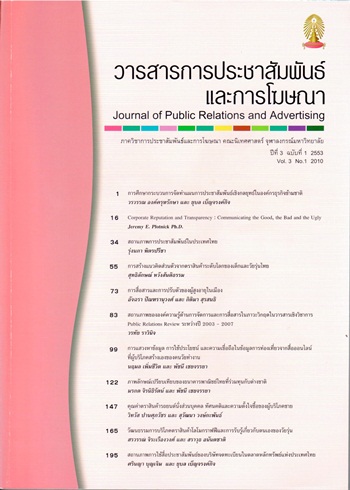การสื่อสารและการปรับตัวของผู้สูงอายุในเมือง
Main Article Content
Abstract
The present study aims to investigate different communication behaviors of the elder in urban environment. Also examined was their knowledge and opinion towards aging and perceived self-adjustment. A quantitative method of survey was used to collect data from 400 volunteer respondents aged 60 living in Bangkok.
Results show that most respondents used interpersonal and group communication as a mean to interact and establish their relationship with others, while mass media were more used for daily relaxation or as an escape from loneliness and boredom. Radio ranks the first as mass medium used most by the elders, followed by television. Interestingly, none of the respondents reported that they had been to the cinema or logged on to the World Wide Web.
Most respondents had moderate knowledge about aging. However, they had relatively positive opinion towards being old. Perceived self-adjustment was found to be highest for emotional self-adjustment, followed by health self-adjustment, followed by health self-adjustment and social self-adjustment respectively.
Mass communication and interpersonal communication was found to have positive correlation with knowledge about aging. Moreover, there is also a positive correlation between all types of communication and self-adjustment, except for the pair of group communication and social self-adjustment. Finally, results indicate a positive correlation between knowledge about aging and the elders’ opinion and perceived self-adjustment, except for the elder’s opinion towards relationship with younger members of the family which was found to have a negative correlation with knowledge about aging.


